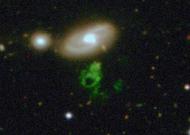We discussed the
Galaxy Zoo project soon after it launched last summer. Science News is now
following developments about an odd celestial object
that is fueling a lot of excitement among astronomers around the world. In August, a Dutch schoolteacher named Hanny, in the process of characterizing galaxy images, noticed a peculiar object and posted a query about it on the Galaxy Zoo blog. She called it a "Voorwerp," which Science News says is Dutch for "thing" but which Google translates as "subject." Hanny's Voorwerp emits mostly green light (the earlier report said blue). The best guess astronomers have now is that the Voorwerp is emitting "ghost light," i.e. it is "lit by the ultraviolet light and X-rays from a quasar that has vanished in the last 100,000 years," to quote astronomer Bill Keel. "As far as we can tell, it's an unprecedented thing," Keel added. Researchers are scrambling to book time on the Hubble and other major telescopes to get a closer look.







